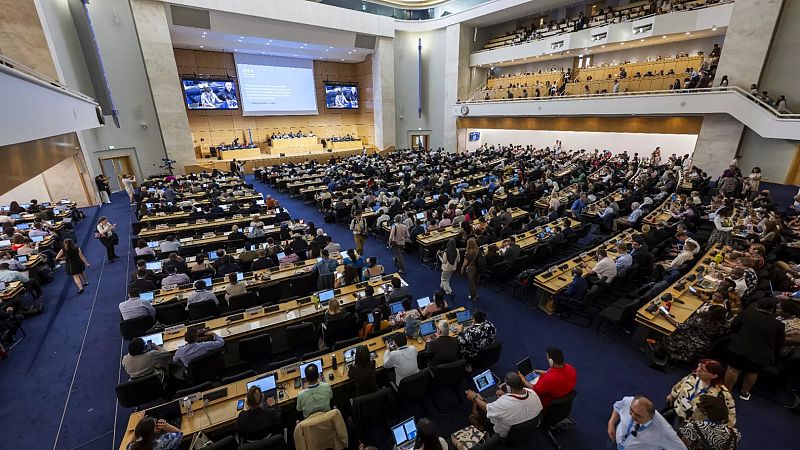Global plastics treaty talks stall as nations divided over limiting production

Negotiators working on a treaty to address global plastic pollution discussed a new draft of the text on Wednesday that wouldn't limit plastic production or address chemicals used in plastic products.
Talks stalled just one day before they are due to end after countries with very divergent views expressed disappointment with the draft.
It could change significantly, and a new version is expected on Thursday, the last scheduled day of the negotiations.
'Unbalanced' or a 'good enough' starting point?
When they convened on Wednesday night, Colombia's delegation said that the text was entirely unacceptable because it was unbalanced and lacked the ambition and global obligations needed to end plastic pollution. The delegation said that it wouldn't accept the wording as the basis for negotiations.
The head of Panama’s delegation to the talks, Juan Carlos Monterrey Gómez, stood up and cheered. Many delegations made statements to agree, including Mexico, Chile, Ghana, Canada, Norway, the United Kingdom, the European Union and the group of small island developing states.
"We have made clear that the text on the table is not acceptable for the EU," European Commissioner for Environment, Water Resilience, and a Competitive Circular Economy, Jessika Roswall, said.
EU representative Magnus Heunicke said in a post on social media that the text "doesn't meet the minimum needed to respond to the huge plastic challenge".
“Let me be clear, this is not acceptable for future generations,” said Erin Silsbe, representing Canada.
Oil- and gas-producing nations raised other concerns, with Saudi Arabia, Kuwait, Qatar and others saying that the draft doesn't have the scope they want to set the parameters of the treaty or precise definitions.
The United States said that six articles crossed red lines, but didn't say how.
India’s delegation, on the other hand, said that the draft is a “good enough starting point.”
What was included in the treaty draft?
The draft contains one mention of plastic production in the preamble, reaffirming the importance of promoting sustainable production and consumption of plastics. It doesn't contain an article on production from a previous draft. There is no mention of chemicals.
The new provisions seek to reduce the number of problematic plastic products that often enter the environment and are difficult to recycle, and promote the redesign of plastic products so that they can be recycled and reused. Parties to the treaty would improve their waste management.
Luis Vayas Valdivieso, the chair of the negotiating committee, drafted the document based on the views expressed by nations throughout the negotiations. He told them that he did it to move them closer to a legally-binding instrument, and they can shape and improve it, as well as add and delete wording.
With little time left, he said, it's time to build bridges, not dig in over red lines.
David Azoulay, Head of the delegation for the Centre for International Environmental Law, said the text makes "a mockery of a three-year-long consultative process" - one that included board support for a treaty addressing the full lifecycle of plastics.
"This is a treaty that all but ensures that nothing will change. It gives in to petrostate and industry demands with weak, voluntary measures that guarantee we continue to produce plastic at increasing levels indefinitely, fail to safeguard human health, endanger the environment, and damn future generations," he adds.
"It will be very difficult to come back from this, and we encourage Member States to reject the text."
What is blocking progress on the plastics treaty?
The biggest issue of the talks has been whether the treaty should impose caps on producing new plastic or focus instead on things like better design, recycling and reuse.
Around 100 countries want to limit production as well as tackle cleanup and recycling. Many have said it’s essential to address toxic chemicals.
Powerful oil and gas-producing nations and the plastics industry oppose production limits. They want a treaty focused on better waste management and reuse.

